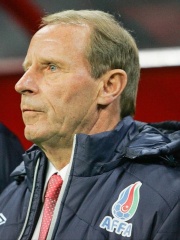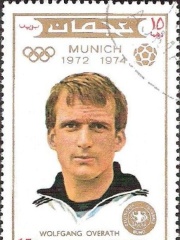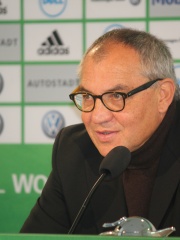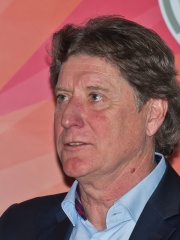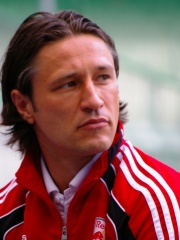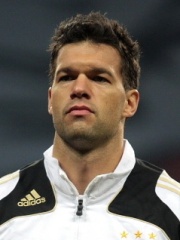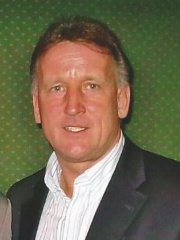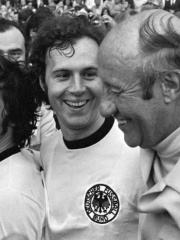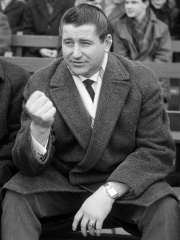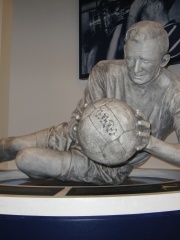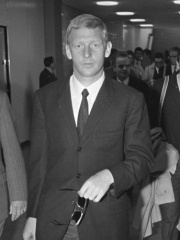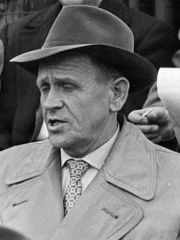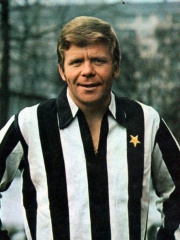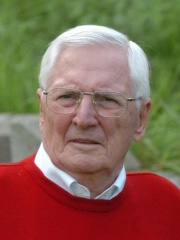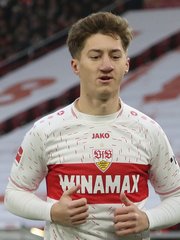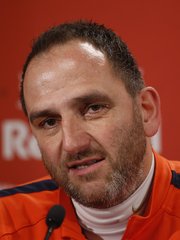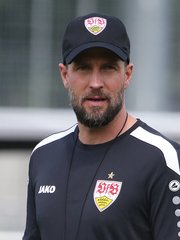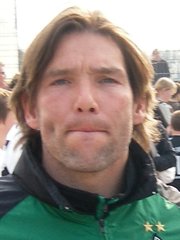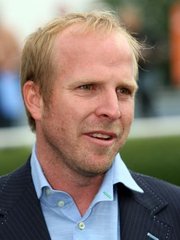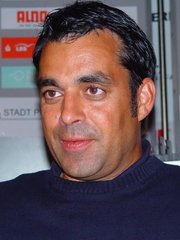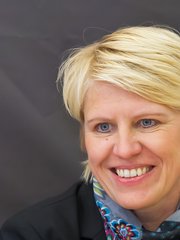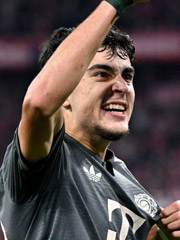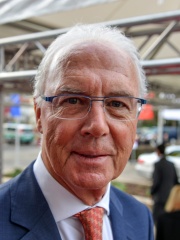
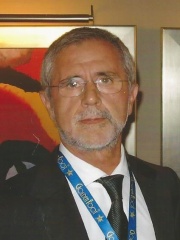
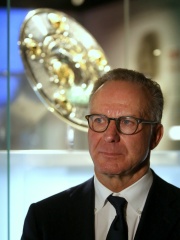
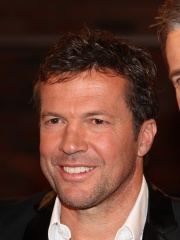
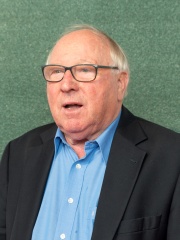
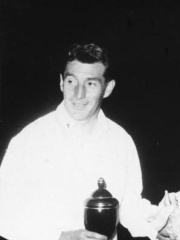
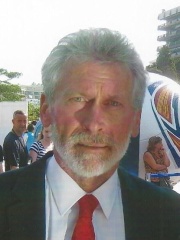
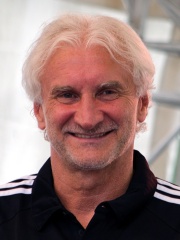
The Most Famous
SOCCER PLAYERS from Germany
This page contains a list of the greatest German Soccer Players. The pantheon dataset contains 21,273 Soccer Players, 1,013 of which were born in Germany. This makes Germany the birth place of the 6th most number of Soccer Players behind Spain, and France.
Top 10
The following people are considered by Pantheon to be the top 10 most legendary German Soccer Players of all time. This list of famous German Soccer Players is sorted by HPI (Historical Popularity Index), a metric that aggregates information on a biography's online popularity. Visit the rankings page to view the entire list of German Soccer Players.

1. Franz Beckenbauer (1945 - 2024)
With an HPI of 83.54, Franz Beckenbauer is the most famous German Soccer Player. His biography has been translated into 97 different languages on wikipedia.
Franz Anton Beckenbauer (German pronunciation: [fʁants ˈbɛkn̩ˌbaʊɐ] ; 11 September 1945 – 7 January 2024) was a German professional football player, manager, and official. Nicknamed der Kaiser ("the Emperor"), he is widely regarded as one of the greatest and most influential players of all time. Beckenbauer was a versatile player who started out as a midfielder, but made his name as a centre-back. He is often credited as having invented the role of the modern sweeper (libero). Twice named European Footballer of the Year, Beckenbauer appeared 103 times for West Germany, playing in three FIFA World Cups and two European Championships. He is one of ten players to have won the FIFA World Cup, the European Cup, and the Ballon d'Or. He is one of three men, along with Brazil's Mário Zagallo and France's Didier Deschamps, to have won the World Cup as a player and as a manager; he lifted the World Cup trophy as captain in 1974, and repeated the feat as a manager in 1990. He was the first captain to lift the World Cup and European Championship at the international level and the European Cup at the club level. He was named in the World Team of the 20th Century in 1998, the FIFA World Cup Dream Team in 2002, the Ballon d'Or Dream Team in 2020, the IFFHS All-time Men's Dream Team in 2021, and in 2004, was listed in the FIFA 100 of the world's greatest living players. In August 2024, the International Sports Press Association (AIPS) voted him as the third best footballer of the past 100 years after Pelé and Diego Maradona. At club level with Bayern Munich, Beckenbauer won the European Cup Winners' Cup in 1967 and three consecutive European Cups from 1974 to 1976. The latter feat made him the first player to win three European Cups as captain of his club. He became team manager and later president of Bayern Munich. After two spells with the New York Cosmos he was inducted into the US National Soccer Hall of Fame. Beckenbauer led Germany's successful bid to host the 2006 FIFA World Cup and chaired the organizing committee. He worked as a pundit for Sky Germany, and for 34 years as a columnist for the tabloid Bild, both until 2016. Beginning August 2016, he was investigated for fraud and money laundering in connection with the 2006 World Cup. The investigation was closed without a verdict in 2020 as the statute of limitations expired.

2. Gerd Müller (1945 - 2021)
With an HPI of 83.25, Gerd Müller is the 2nd most famous German Soccer Player. His biography has been translated into 85 different languages.
Gerd Müller (German pronunciation: [ˈɡɛʁt ˈmʏlɐ]; 3 November 1945 – 15 August 2021) was a German professional footballer. A prolific striker, especially in and around the six-yard box, he is widely regarded as one of the greatest goalscorers and players in the history of the sport. With success at club and international level, he is one of ten players to have won the FIFA World Cup, the UEFA Champions League and the Ballon d'Or. At international level with West Germany, he scored 68 goals in 62 appearances, and at club level, in 15 years with Bayern Munich, in which he scored 365 goals in 427 Bundesliga matches, he became—and still is—record holder of that league. In 74 European club games he scored 65 goals. Averaging over a goal a game with West Germany, Müller was, as of 11 July 2021, 21st on the list of all time international goalscorers, despite having played fewer matches than every other player in the top 48. Among the top scorers, he has the third-highest goal-to-game ratio. He also had the highest ratio of 0.97 goals per game in the European Cup, scoring 34 goals in 35 matches. Nicknamed "Bomber der Nation" ("the nation's Bomber") or simply "Der Bomber", Müller was named European Footballer of the Year in 1970. After a successful season at Bayern Munich, he scored ten goals at the 1970 FIFA World Cup for West Germany where he received the Golden Boot as top goalscorer, before winning the 1970 Ballon d'Or. In 1972, he won the UEFA European Championship and was the top goalscorer, scoring two goals in the final. Two years later, he scored 4 goals in the 1974 FIFA World Cup, including the winning goal in the final. Müller held the all-time goal-scoring record in the World Cup with 14 goals for 32 years. In 1999, Müller was ranked ninth in the European Player of the Century election held by the International Federation of Football History & Statistics (IFFHS), and he was voted 13th in the IFFHS' World Player of the Century election. In 2004, Pelé named Müller in the FIFA 100 list of the world's greatest living players.

3. Karl-Heinz Rummenigge (b. 1955)
With an HPI of 74.28, Karl-Heinz Rummenigge is the 3rd most famous German Soccer Player. His biography has been translated into 55 different languages.
Karl-Heinz "Kalle" Rummenigge (German: [ˌkaʁlˈhaɪnts ˈkalə ˈʁʊmənɪɡə]; born 25 September 1955) is a German football executive and former professional player. Considered as one of the best players of his generation and one of the greatest German footballers of all time, he was also the longtime Chairman of Executive Board of FC Bayern München AG, a daughter company of German Bundesliga team Bayern Munich. As a player, Rummenigge had his greatest career success with Bayern Munich, where he won the Intercontinental Cup, two European Cups, as well as two league titles and two domestic cups. He also won two Ballon d'Or awards, in 1980 and 1981. In 2004, Rummenigge was named by Pelé in the FIFA 100 list of the world's greatest living players. A member of the West Germany national team, Rummenigge won the 1980 European Championship and was part of the squad that finished runner-up in the 1982 FIFA World Cup and at the 1986 World Cup. Rummenigge is a former chairman of the European Club Association (ECA), serving in that capacity from 2008 until 2017. He also served as representative of the ECA to the UEFA Executive Committee from 2021 to 2024.

4. Lothar Matthäus (b. 1961)
With an HPI of 73.76, Lothar Matthäus is the 4th most famous German Soccer Player. His biography has been translated into 76 different languages.
Lothar Herbert Matthäus (German pronunciation: [ˈloːtaʁ maˈtɛːʊs] ; born 21 March 1961) is a German football pundit and former professional player and manager. He captained West Germany to victory in the 1990 FIFA World Cup and was awarded the Ballon d'Or. In 1991, he was named the first FIFA World Player of the Year, and remains the only German to have received the award. He was also included in the Ballon d'Or Dream Team in 2020. Matthäus was the first outfield player, and second overall after Antonio Carbajal, to appear at five FIFA World Cups (1982, 1986, 1990, 1994 and 1998); he remains one of only six male players to have done so, along with Antonio Carbajal, Rafael Márquez, Lionel Messi, Cristiano Ronaldo, and Andrés Guardado. He also won UEFA Euro 1980, and played in the 1984, 1988 and 2000 UEFA European Championships. In 1999, aged 38, Matthäus was again voted German Footballer of the Year, having previously won the award in 1990. Matthäus is the most capped German player of all time, retiring with a total of 150 appearances (83 for West Germany) in 20 years, and 23 goals. Matthäus is a member of the FIFA 100 list of the greatest living football players chosen by Pelé. Diego Maradona said of Matthäus, "He is the best rival I've ever had. I guess that's enough to define him." A versatile and complete player, Matthäus is regarded as one of the greatest midfielders of all time, and was renowned for his perceptive passing, positional sense and well-timed tackling, as well as his powerful shooting. During his career, he usually played as a box-to-box midfielder, although late in his career he played as a sweeper.
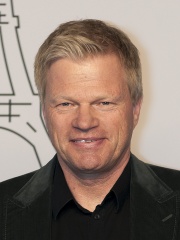
5. Oliver Kahn (b. 1969)
With an HPI of 72.34, Oliver Kahn is the 5th most famous German Soccer Player. His biography has been translated into 75 different languages.
Oliver Rolf Kahn (German: [ˈɔlivɐ ˈkaːn]; born 15 June 1969) is a German football executive and former professional player who played as a goalkeeper. He started his career in the Karlsruher SC Junior team in 1975. Twelve years later, Kahn made his debut match in the professional squad. In 1994, he was transferred to Bayern Munich for the fee of DM 4.6 million, where he played until the end of his career in 2008. His commanding presence in goal and aggressive style earned him nicknames such as Der Titan ([deːɐ̯ tiˈtaːn], "The Titan") from the press and Vul-kahn ("volcano") from fans. Kahn is one of the most successful German players in recent history, having won eight Bundesliga titles, six DFB-Pokals, the UEFA Cup in 1996, the UEFA Champions League and the Intercontinental Cup, both achieved in 2001. Regarded as one of the greatest goalkeepers of all time, his individual contributions have earned him a record four consecutive UEFA Best European Goalkeeper awards, as well as three IFFHS World's Best Goalkeeper awards, and two German Footballer of the Year trophies. At the 2002 FIFA World Cup, Kahn became the only goalkeeper in the tournament's history to win the Golden Ball. Kahn placed fifth in both the IFFHS Best Goalkeeper of the 21st Century and Best Goalkeeper of the Past 25 Years elections. From 1994 to 2006, Kahn was in the Germany national team, in which he played as a starter after the retirement of Andreas Köpke, he was an unused member of the squad that won the 1996 UEFA European Championship. In the 2002 FIFA World Cup, although Germany were not among the tournament favourites, Kahn's prowess, despite being injured, in goal was key to reaching the final, where Germany lost 0–2 to Brazil. Kahn made a mistake on Brazil's first goal; nonetheless, he received the Golden Ball as player of the tournament. From July 2021 to May 2023, he was the CEO of Bayern Munich.

6. Uwe Seeler (1936 - 2022)
With an HPI of 72.14, Uwe Seeler is the 6th most famous German Soccer Player. His biography has been translated into 51 different languages.
Uwe Seeler (German pronunciation: [ˈuːvə ˈzeːlɐ]; 5 November 1936 – 21 July 2022) was a German footballer and football official. As a striker, he was a prolific scorer for Hamburger SV and also made 72 appearances for the West Germany national team. Widely regarded as one of the greatest players in German football history, Seeler was named one of FIFA's 100 greatest living players by Pelé in 2004. He was the first football player to be awarded the Commander's Cross of the Order of Merit of the Federal Republic of Germany.

7. Fritz Walter (1920 - 2002)
With an HPI of 71.76, Fritz Walter is the 7th most famous German Soccer Player. His biography has been translated into 53 different languages.
Friedrich "Fritz" Walter (German: [ˈfʁiːdʁɪç fʁɪts ˈvaltɐ] ; 31 October 1920 – 17 June 2002) was a German footballer who spent his entire senior career at 1. FC Kaiserslautern. He usually played as an attacking midfielder or inside forward. In his time with the Germany and West Germany national teams, he appeared in 61 games and scored 33 goals, and was the captain of the team that won the 1954 FIFA World Cup. After his career, he was named honorary captain of the Germany national team.

8. Paul Breitner (b. 1951)
With an HPI of 71.43, Paul Breitner is the 8th most famous German Soccer Player. His biography has been translated into 57 different languages.
Paul Breitner (German pronunciation: [ˈpaʊl ˈbʁaɪtnɐ]; born 5 September 1951) is a German former professional footballer who played as a midfielder and left-back. Considered one of the best full-backs and midfielders of all time, and one of the best players of his era, Breitner was named in the FIFA World Cup All-Time Team. In 2004 he was named one of the Top 125 greatest living footballers as part of FIFA's 100th anniversary celebration. Breitner was capped 48 times for West Germany and was an integral part of the team that won the 1974 FIFA World Cup, scoring in the final. He also scored in the final of the 1982 FIFA World Cup, making him one of only five players to have scored in two different World Cup final matches, the others being Pelé, Vavá, Zinedine Zidane and Kylian Mbappé. He was known for his partnerships with Franz Beckenbauer, Hans-Georg Schwarzenbeck and Berti Vogts in defence for the national team, and his midfield combination with Karl-Heinz Rummenigge for Bayern Munich. Breitner has been working as a commentator, pundit and columnist in Germany since retiring and is also an advisor to the Bayern management board.

9. Rudi Völler (b. 1960)
With an HPI of 70.51, Rudi Völler is the 9th most famous German Soccer Player. His biography has been translated into 55 different languages.
Rudolf "Rudi" Völler (pronounced [ˈfœlɐ]; born 13 April 1960) is a German professional football manager and former player, who is currently the director of the Germany national team. During his active years as a player he was sometimes nicknamed "Tante Käthe" ("Aunt Kathy"), a name bestowed upon him by Thomas Berthold in reference to his permed hairstyle, and in Italy, he is nicknamed "Il tedesco volante" ("The flying German") by supporters of Roma. A forward, Völler began his professional career at Kickers Offenbach, before joining 1860 Munich, and he was top scorer of the 2. Bundesliga in the 1981–82 season. He went on to play for Werder Bremen, where he was noted for his consistent goalscoring, becoming the top scorer of the Bundesliga in the 1982–83 season. Völler moved abroad, firstly transferring to Serie A club Roma and then to Ligue 1 club Olympique Marseille. At Roma, he won the Coppa Italia and was runner-up of the UEFA Cup during the 1990–91 season; he was also top scorer of both these tournaments. At Marseille, he won the French title and the Champions League in the 1992–93 season, but following a match fixing scandal, the club were stripped of their league title and were relegated in 1994. The same year, Völler returned to his native country, ending his career at Bayer Leverkusen. Völler made his debut for the Germany national team, then known as West Germany, in 1982. He represented his country at three FIFA World Cups and UEFA European Championships each, during a successful period for Die Nationalmannschaft. Völler played in two consecutive World Cup finals, both of which were against Argentina, and he won the trophy in 1990. At the time of his retirement in 1994, he was Germany's second highest goalscorer behind Gerd Müller; he is now joint-fourth with Jürgen Klinsmann, having been surpassed by Miroslav Klose and Lukas Podolski. After retiring as a player with Bayer Leverkusen, he became the sporting director of the club until 2000, where he was the interim manager for twelve matches, before being succeeded by Berti Vogts. He was then appointed caretaker manager of the Germany national team, despite his lack of coaching experience. In the wake of the drug scandal that involved the preferred choice of the DFB, Christoph Daum, Völler was ultimately kept on, and was able to lead Germany to the 2002 FIFA World Cup final, where they lost to Brazil. Along with Mário Zagallo, Franz Beckenbauer and Didier Deschamps, Völler has the distinction of reaching a World Cup final as both a player (1986 and 1990) and as a manager (2002). Following a group-stage exit at UEFA Euro 2004, Völler resigned as manager, after which he had a short-lived spell as manager of his former club Roma. He later returned to Leverkusen, where he was briefly interim manager again, and became the club's sporting director for the second time, a position he held until 2022. In February 2023, he was appointed director of the Germany national team.
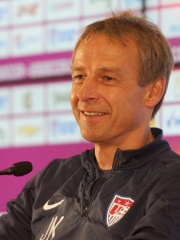
10. Jürgen Klinsmann (b. 1964)
With an HPI of 69.93, Jürgen Klinsmann is the 10th most famous German Soccer Player. His biography has been translated into 69 different languages.
Jürgen Klinsmann (German pronunciation: [ˈjʏʁɡn̩ ˈkliːnsman]; born 30 July 1964) is a German professional football manager and former player. He played for several prominent clubs in Europe including VfB Stuttgart, Inter Milan, Monaco, Tottenham Hotspur, and Bayern Munich. He was part of the West German team that won the 1990 FIFA World Cup and the unified German team that won the UEFA Euro 1996. As a manager, Klinsmann managed the German national team to a third-place finish at the 2006 FIFA World Cup and was subsequently coach of a number of other teams including, notably Bundesliga club Bayern Munich and the United States national team. Considered one of Germany's premier strikers during the 1990s, Klinsmann scored in all six major international tournaments he participated in for Germany, from the UEFA Euro 1988 to the 1998 FIFA World Cup. In 1995, he came in third in the FIFA World Player of the Year award; in March 2004 he was named in the FIFA 100 list of the "125 Greatest Living Footballers". In 2016, he became the fifth player to be named as honorary captain of Germany.
People
Pantheon has 1,013 people classified as German soccer players born between 1872 and 2006. Of these 1,013, 879 (86.77%) of them are still alive today. The most famous living German soccer players include Karl-Heinz Rummenigge, Lothar Matthäus, and Oliver Kahn. The most famous deceased German soccer players include Franz Beckenbauer, Gerd Müller, and Uwe Seeler. As of April 2024, 110 new German soccer players have been added to Pantheon including Angelo Stiller, Nick Woltemade, and Frank Schmidt.
Living German Soccer Players
Go to all RankingsKarl-Heinz Rummenigge
1955 - Present
HPI: 74.28
Lothar Matthäus
1961 - Present
HPI: 73.76
Oliver Kahn
1969 - Present
HPI: 72.34
Paul Breitner
1951 - Present
HPI: 71.43
Rudi Völler
1960 - Present
HPI: 70.51
Jürgen Klinsmann
1964 - Present
HPI: 69.93
Berti Vogts
1946 - Present
HPI: 69.89
Wolfgang Overath
1943 - Present
HPI: 68.19
Felix Magath
1953 - Present
HPI: 67.58
Harald Schumacher
1954 - Present
HPI: 67.50
Niko Kovač
1971 - Present
HPI: 67.47
Michael Ballack
1976 - Present
HPI: 67.27
Deceased German Soccer Players
Go to all RankingsFranz Beckenbauer
1945 - 2024
HPI: 83.54
Gerd Müller
1945 - 2021
HPI: 83.25
Uwe Seeler
1936 - 2022
HPI: 72.14
Fritz Walter
1920 - 2002
HPI: 71.76
Andreas Brehme
1960 - 2024
HPI: 68.55
Helmut Schön
1915 - 1996
HPI: 68.48
Helmut Rahn
1929 - 2003
HPI: 68.44
Bert Trautmann
1923 - 2013
HPI: 67.88
Karl-Heinz Schnellinger
1939 - 2024
HPI: 67.43
Sepp Herberger
1897 - 1977
HPI: 66.32
Helmut Haller
1939 - 2012
HPI: 66.18
Jupp Derwall
1927 - 2007
HPI: 65.87
Newly Added German Soccer Players (2025)
Go to all RankingsAngelo Stiller
2001 - Present
HPI: 48.31
Nick Woltemade
2002 - Present
HPI: 48.30
Frank Schmidt
1974 - Present
HPI: 48.08
Rainer Ernst
1961 - Present
HPI: 47.80
Sebastian Hoeneß
1982 - Present
HPI: 47.34
Ann-Katrin Berger
1990 - Present
HPI: 47.27
Uwe Kamps
1964 - Present
HPI: 46.14
Martin Kree
1965 - Present
HPI: 46.08
Markus Münch
1972 - Present
HPI: 46.03
Robin Dutt
1965 - Present
HPI: 45.69
Doris Fitschen
1968 - 2025
HPI: 45.51
Aleksandar Pavlović
2004 - Present
HPI: 44.67
Overlapping Lives
Which Soccer Players were alive at the same time? This visualization shows the lifespans of the 25 most globally memorable Soccer Players since 1700.

